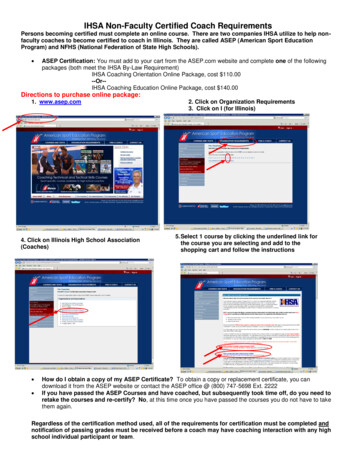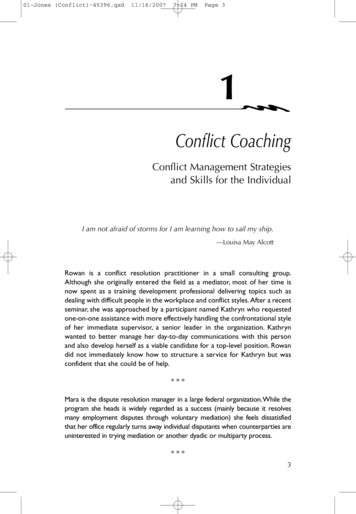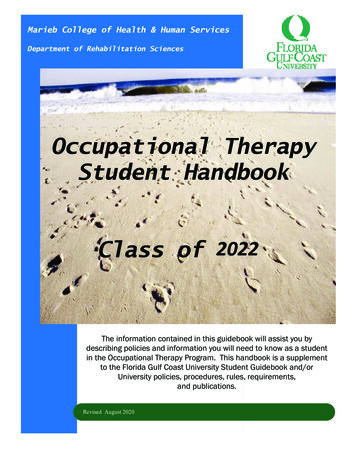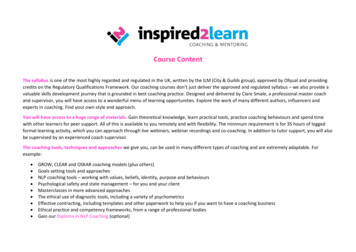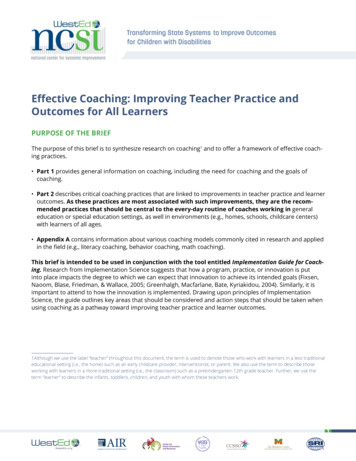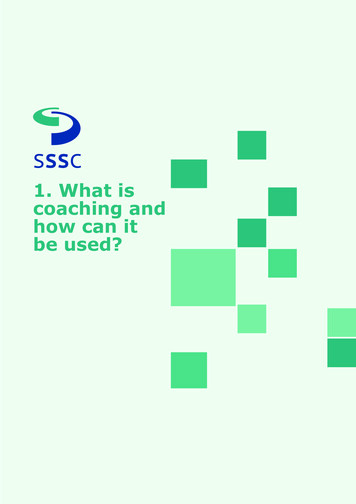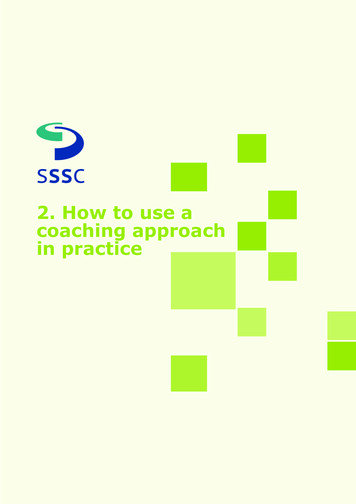
Transcription
OccupationalPerformance CoachingApplied to the Picky Eating PopulationDr. Lisa Johnson, OTRL10/14/18
Objectives1.Theoretical and philosophical basis of Occupational PerformanceCoaching (OPC)2.3.4.Description of OPCResearch: Others and my ownDiscuss application in other contexts
Occupational Performance Coaching Developed by Fiona Graham, Sylvia Rodger and Jenny Ziviani in 2009. The goal was to work with parents to achieve occupational performancegoals for the parents and their children
Why I love OPC The caregiver needs are addressedMore buy in and we share responsibility for the outcomeOccupational based approachMore effective than a bottom up approachAlternative service delivery model
What does a session look like? Coach parents to identify adjustments in the home or community that cancreate a better match between the person, occupation and environment.
Theoretical perspective Enablement perspective of health Occupation centered practice Family centered practice
Three Enabling Domains Emotional Support Information Exchange Structured process
ListenEmpathizeReframeGuideEncourage
Three Enabling Domains Emotional Support Information Exchange
Reciprocal Information Exchange Typical developmentHealth conditions and impairmentsTeaching and learning strategiesSpecialized strategiesProvision of information on communityresources.
Collaborative Performance Analysis” is a goal specific examination of occupational performance based oninformation exchanged between the caregiver and the OT” structured, step-wise process based on observation or caregiver report
WhatcurrentlyhappensParent NeedsinimplementingchangeWhat parentswould like tohappenBarriers andbridges toenablingperformance
Parental MotivationNeed to see obvious improvement within a fewdays or 2-3 weeks at most
Therapist’s Goal during the CollaborativeProcess What needs to be different in order for the child to be successful at this task What needs to be different for the parent to enable change Develop parents ability to find solutions to their children’s performancechallenges
Three Enabling Domains Emotional Support: Listen, empathize, reframe, guide, and encourage Information Exchange: What currently happens, what the parent would liketo happen, barriers to performance, parental needs Structured process
Structured Problem-Solving Process
Occupational Performance Coaching Approach Coach parents to identify adjustments in the home or community that cancreate a better match between the person, occupation and environment. Three Underlying Theoretical Principles: Enablement, OccupationalCentered, Family Centered Three Domains: Emotional Support, Information Exchange, StructuredProblemsolving
Research about OPC Three studies conducted by Graham, Rodger and Ziviana in 2010, 2013, and2014
Enabling Occupational Performance ofChildren Through Coaching Graham, F., Rodger, S., & Ziviani, J. (2010). Enabling occupationalperformance of children through coaching parents: Three casereports. Physical & Occupational Therapy in Pediatrics, 30(1), 4-15.
Findings Research question: Can OPC contribute to changes in occupational performanceand what are the parent experiences with OPC?Instruments: Canadian Occupational Performance Measure (COPM) and the GoalAttainment Scale (GAS)Size of study: N 3Design: Descriptive case study Methodology with pre and post interventionmeasures, 10 weekly, 1 hours sessionsResults: Changes in parent satisfaction higher than actual performance. Parentsreported increased learning, changes at home, rewarding challenge
Effectiveness of OPC in improving children’sperformance and mother’s self competence Graham, F., Rodger, S., & Ziviani, J. (2013). Effectiveness of occupationalperformance coaching in improving children’s and mothers’ performanceand mothers’ self-competence. American Journal of OccupationalTherapy, 67(1), 10-18
Findings Research Question: Does use of OPC result in change in occupational performanceand parental sense of competence?Instruments: COPM and GAS , Parenting Sense of Competence (PSOC)Size of the study:29 children, 8 mothersDesign: Pre-wait list, pre-intervention, post intervention, follow up. Interventionlasting 3 to 8 weeksResults: Post hoc analysis revealed clinically significantly improvement inoccupation. Internal consistency of the PSOC was low so with cautiously the studycan be interpreted to have significant improvement in self competence
Mothers experiences of engaging inOccupational Performance Coaching Graham, F., Rodger, S., & Ziviani, J. (2014). Mothers' experiences ofengaging in occupational performance coaching. British Journal ofOccupational Therapy, 77(4), 189-197.
Findings Research Question: are the parents receptive to being coached, and what wastheir perceptionInstruments: Purpose designed surveySize: N 29Design: Mixed methods study, survey and interview, data was analyzeddescriptivelyResults: gain in insight of self, learned specific strategies, greater understanding oftheir children, calmer & happier emotional tone in the family
Objectives1.Theoretical and philosophical basis of Occupational PerformanceCoaching (OPC)2.3.Description of OPCResearch: Others and my own
Occupational Performance Coaching forCaregivers of Picky Eaters Johnson, L, Jewell, V, Smith, S. Occupational Performance Coaching forCaregivers of Picky Eaters.
Introduction Importance of this research Based on Occupational therapy principles- Occupational Performance Coaching,Occupational Therapy Practice Framework, AOTA Feeding Practice GuidelinesInnovative service delivery modelMeeting a community/societal need ie. Healthy AmericaTriple Aim-Improving patient experience (quality and satisfaction), Health populations,fiscally responsible (reducing cost per capita of healthcare)
Background Information The definition of picky eating includes rejecting certain types of foods orfood groups necessary for a balanced diet 30% of typically developing children and 80% of children withdevelopmental disabilities experience feeding problems (Mascola, Bryson &Agra, 2010; Volkert, & Piazza, 2012). Feeding problems impact a child’s participation and satisfaction of eatingand simultaneously create stress and anxiety for the caregiver (Absolom &Roberts, 2011; Franklin & Rogers, 2003).
The Problem Pediatric eating is a dynamic processCaregiver impacts what is eaten, timing, social/physical environmentTraditional OT focuses solely on the child’s sensory motor and behavioralimpairmentsWho is addressing the family interaction and stress that is caused by theimpairments?A family-centered approach recognizes and address disruptions in the child’sfeeding routine and the impact for the entire family unit
Research Questions Does use of the Occupation Performance Coaching model with caregivers ofyoung picky eaters Increase the caregiver’s confidence in their role and skills at family mealtimes?Increase the reports of positive mealtime experience for the family?Reduce maladaptive mealtime behaviors expressed by the child?Reduce the severity of the feeding problem for the child?
Research Methods Type of Study:Descriptive case study with pre and post-interventionmeasure Subjects: 2 children, age 4, with no diagnosis Instruments: COPM, GAS, Montreal Children’s Hospital Feeding Scale(MCHFS), Mealtime Behavior Questionnaire (MBQ) Data Analysis: Raw Data from COPM and Gas and T-Scores MCHFS andMBQ
COPM FindingsRole Performance based on1-10 scaleChild 1Child 2Satisfaction with Role Performancebased on 1-10 scaleGoal of caregiverPretestWeek 2Week 4Week 6C*PretestWeek 2Week 4Week 6C*To have child eatthe nutritioushome cooked foodthat the motherprepares5689457894To have the childeat nutritious foodfor better growthand development34230359107COPM Score for Caregiver Role PerformanceNote: COPM is a 10 point scale with1 being not satisfied and 10 being fully satisfied
GAS FindingsChild 1Child 2Goal for ChildPre-InterventionWeek 2Week 4Week 6ChangeChild will put new food in mouth x3 and swallowx1-1-1212Child will complete a meal in 20-30 minutes-1-1012Child will sit on his bottom at the table for 10minutes during the family meal***-1-2-112Child will not remove or gag in response to nonpreferred food on the plate-10012Child will stab or scoop non-preferred food andbring to his lips **-10123**Note: These goals were upgraded after the first visit when the child exceeded what the family initially anticipated.
Montreal Children’s HospitalFeeding Scale Findings8070Ordinal score605040Child 1Child 23020100Pre testWeek 6ChildFigure 1 Montreal Children’s Hospital Feeding Scale for Child 1 and 2 comparison of pre-test and week 6 feeding difficulty outcome.Note. T-score ranges 61-65 mild feeding difficulty, 66-70 moderate feeding difficulty, above 70 severe feeding difficulties.
Mealtime BehaviorQuestionnaire Findings120100Test scores8060Child 1Child 240200pretestweek twoweek fourweek sixData pointsMealtime Behavior Scale total scores for Child 1 and Child 2from pre-test to week 6.
Discussion Increase in caregiver role performance (1/2) and satisfaction (2/2) Child’s performance exceeded parents expectations Reduction in feeding impairment severity to mild and non-existent Reduction in maladaptive behaviors with tools to tackle residual behaviors
Objectives1.Theoretical and philosophical basis of Occupational PerformanceCoaching (OPC)2.3.4.Description of OPCResearch: Others and my ownDiscussion of Application in other contexts
Transformation is possible with a littlecoaching
References American Occupational Therapy Association (2007). Specialized knowledge and skills in feeding, eating and swallowing in occupational therapy. American Journal ofOccupational Therapy, 61, 686-700.Graham, F. & Rodger, S. (2010). Occupational performance coaching: Enabling parents’ and children’s occupational performance. In S. Rodger (Ed.), Occupation-CenteredPractice with children: A practical guide for occupational therapists (pp. 203-226). West Sussex, United Kingdom: Wiley-Blackwell.Graham, F., Rodger, S., & Ziviani, J. (2009). Coaching parents to enable children's participation: An approach for working with parents and their children. AustralianOccupational Therapy Journal, 56(1), 16-23. Graham, F., Rodger, S., & Ziviani, J. (2010). Enabling occupational performance of children through coaching parents: Three case reports. Physical & OccupationalTherapy in Pediatrics, 30(1), 4-15. http://dx.doi.org/10.3109/01942630903337536Graham, F., Rodger, S., & Ziviani, J. (2013). Effectiveness of occupational performance coaching in improving children’s and mothers’ performance and mothers’ selfcompetence. American Journal of Occupational Therapy, 67(1), 10-18. http://dx.doi.org/10.5014/ajot.2013.004648Graham, F., Rodger, S., & Ziviani, J. (2014). Mothers' experiences of engaging in occupational performance coaching. The British Journal of Occupational Therapy, 77(4),189-197. The IHI Triple Aim (2016). Institute for Healthcare Improvement. Retrieved from ges/default.aspx
Oct 14, 2018 · Occupational performance coaching: Enabling parents’ and children’s occupational performance. In S. Rodger (Ed.), Occupation-Centered Practice with children: A practical guide for occupational therapists (pp. 203-226). West Sussex, United Kingdom: Wiley-Blackwell. Graham, F., Rodger, S., & Ziviani, J


